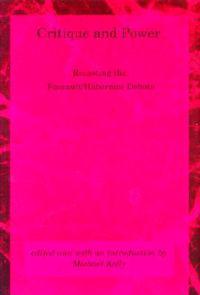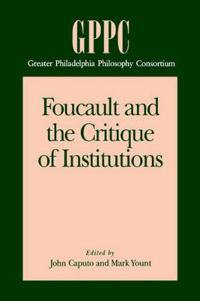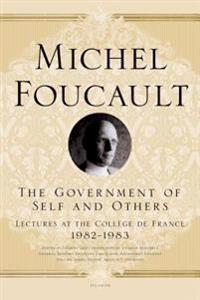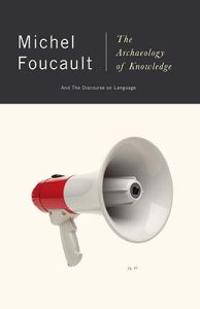Foucault's Futures (häftad)
ISBN: 9780231176415 - UTGIVEN: 2017-04In Foucault's Futures, Penelope Deutscher reconsiders the role of procreation in Foucault's thought, especially its proximity to risk, mortality, and death. She brings together his work on sexuality and biopolitics to challenge our understanding of the politicization of reproduction. By analyzing Fo[...]
Feminism and the Final Foucault (Häftad)
avKaren Vintges
ISBN: 9780252071829 - UTGIVEN: 2004-11Feminism and the Final Foucault is the first systematic offering of contemporary, international feminist perspectives on the later work of philosopher Michel Foucault. Rather than simply debating the merits or limitations of Foucault's later work, the essays in this collection examine women's histor[...]
The Final Foucault (Häftad)
ISBN: 9780262521321 - UTGIVEN: 198801Michel Foucault left a rich legacy of ideas and approaches, many of which still await exposition and analysis. The Final Foucault is devoted to his last published (and some as yet unpublished) work and includes a translation of one of his last interviews, a comprehensive bibliography of his publicat[...]
Critique and Power (Pocket)
avMichael (EDT) Kelly, Michel (EDT) Foucault, Jurgen (EDT) Habermas
ISBN: 9780262610933 - UTGIVEN: 1994-06Which paradigm of critique -- Foucault's or Habermas's -- is philosophically and practically superior, especially with regard to the nature and role of power in contemporary society? In shaping this collection, Michael Kelly has sought to address this question in relation to the ethical, political, [...]
Foucault and Augustine
ISBN: 9780268028695 - UTGIVEN: 2003-12Using Augustine as a conversation partner, this text explores the value of Michel Foucault's controversial writings for theologians, ethicists, philosophers and cultural theorists. It demonstrates the possibilities and difficulties of applying Foucault's social criticisms within Christian contexts.[...]
Foucault and the Critique of Institutions (Häftad)
ISBN: 9780271029665 - UTGIVEN: 1993-06The issue of the institution is not addressed systematically anywhere in the literature on Foucault, although it is everywhere to be found in Foucault's writings. Foucault and the Critique of Institutions not only interprets the work of Foucault but also applies it to the question of the institutio[...]
Feminist Interpretations of Michel Foucault (Pocket)
avSusan J. (EDT) Hekman
ISBN: 9780271032719 - UTGIVEN: 2007-01An exploration of the intersection between the work of Michel Foucault and feminist theory, focusing on Foucault's theories of sex/body, identity/subject, and power/politics. Like the other books in this series, this volume seeks to bring a feminist perspective to bear on the interpretation of a maj[...]
The Hermeneutics of the Subject: Lectures at the College de France 1981-82 (Inbunden)
avMichel Foucault, Frederic Gros, Francois Ewald
ISBN: 9780312203269 - UTGIVEN: 200504"The Hermeneutics of the Subject" is the third volume in the collection of Michel Foucault's lectures at the College de France, one of the world's most prestigious institutions. Faculty at the College give public lectures, in which they present works-in-progress on any subject of their choosing. Fou[...]
Psychiatric Power: Lectures at the College de France, 1973-1974 (Häftad)
avMichel Foucault, Jacques Lagrange, Francois Ewald
ISBN: 9780312203313 - UTGIVEN: 200806In "Psychiatric Power," the fourth volume in the collection of his groundbreaking lectures at the College de France, Michel Foucault addresses and expands upon the ideas in his seminal "Madness and Civilization," sketching the genealogy of psychiatry and of its characteristic form of power/knowledge[...]
The Birth of Biopolitics: Lectures at the College de France, 1978-1979 (Häftad)
avMichel Foucault, Michel Senellart, Francois Ewald
ISBN: 9780312203412 - UTGIVEN: 201003Security, Territory, Population: Lectures at the College de France 1977-1978 (Häftad)
avMichel Foucault, Michel Senellart, Francois Ewald
ISBN: 9780312203603 - UTGIVEN: 200902Marking a major development in Foucault's thinking, this book takes as its starting point the notion of "biopower," studying the foundations of this new technology of power over populations. Distinct from punitive disciplinary systems, the mechanisms of power are here finely entwined with the techno[...]
Abnormal: Lectures at the College de France 1974-1975 (Häftad)
avMichel Foucault, Valerio Marchetti, Antonella Salomoni
ISBN: 9780312424053 - UTGIVEN: 200409From 1971 until his death in 1984, Foucault gave public lectures at the world-famous College de France. Attended by thousands, these were seminal events in the world of French letters. Picador is proud to be publishing the lectures in thirteen volumes.
The lectures comprising "Abnormal begin by e[...]The Hermeneutics of the Subject: Lectures at the College de France 1981-1982 (Häftad)
avMichel Foucault, Frederic Gross, Francois Ewald
ISBN: 9780312425708 - UTGIVEN: 200512"The Hermeneutics of the Subject" is the third volume in the collection of Michel Foucault's lectures at the College de France, where faculty give public lectures on any topic of their choosing. Attended by thousands, Foucault's lectures were seminal events in the world of French letters, and his id[...]
The Government of Self and Others: Lectures at the College de France, 1982-1983 (Häftad)
avMichel Foucault, Arnold I. Davidson
ISBN: 9780312572921 - UTGIVEN: 201104The Temptation of Saint Anthony (Häftad)
avGustave Flaubert, Michel Foucault
ISBN: 9780375759123 - UTGIVEN: 2002-01The Passion of Michel Foucault (Häftad)
avJim Miller
ISBN: 9780385472401 - UTGIVEN: 199412A startling look at one of this century's most influential philosophers, the book chronicles every stage of Foucault's personal and professional odyssey, from his early interest in dreams to his final preoccupation with sexuality and the nature of personal identity.[...]
How to Read Foucault (Pocket)
avJohanna Oksala
ISBN: 9780393328196 - UTGIVEN: 200808Michel Foucault was a philosopher of extraordinary talent, political activist, social theorist, cultural critic, and creative historian. He irreversibly shaped the way we think today about such controversial issues as power, sexuality, madness, and criminality. Johanna Oksala explores the conceptual[...]
The Archaeology of Knowledge (Häftad)
avMichel Foucault, Yourdon
ISBN: 9780394711065 - UTGIVEN: 198209Power/Knowledge (Pocket)
avMichel Foucault
ISBN: 9780394739540 - UTGIVEN: 198012Michel Foucault has become famous for a series of books that have permanently altered our understanding of many institutions of Western society. He analyzed mental institutions in the remarkable Madness and Civilization; hospitals in The Birth of the Clinic; prisons in Discipline and Punish; and sch[...]
The Care of the Self (Häftad)
avMichel Foucault
ISBN: 9780394741550 - UTGIVEN: 198811The Care of the Self is the third and possibly final volume of Michel Foucault's widely acclaimed examination of "the experience of sexuality in Western society." Foucault takes us into the first two centuries of our own era, into the Golden Age of Rome, to reveal a subtle but decisive break from th[...]
The Use of Pleasure (Pocket)
avMichel Foucault
ISBN: 9780394751221 - UTGIVEN: 199003In this sequel to The History of Sexuality, Volume I: An Introduction, the brilliantly original French thinker who died in 1984 gives an analysis of how the ancient Greeks perceived sexuality.Throughout The Uses of Pleasure Foucault analyzes an irresistible array of ancient Greek texts on eroticism [...]
Foucault and Literature
ISBN: 9780415012423 - UTGIVEN: 1992-06The writings of the French historian, literary critic and philosopher Michel Foucault have been of immense importance to developments in literary studies since the late 1970s. He, more than anyone, stands behind the new historicism' and cultural materialism' that currently dominate international lit[...]
Foucault and the Political (Häftad)
ISBN: 9780415100663 - UTGIVEN: 1994-12Michel Foucault's involvement with politics, both as an individual and a writer, has been much commented upon but until now has not been systematically reviewed. This is the first major introductory study of Michel Foucault as a political thinker. Jonathon Simons explores the importance of the polit[...]
Foucault, Health and Medicine (Häftad)
ISBN: 9780415151788 - UTGIVEN: 199704The reception of Michel Foucault's work in the social sciences and humanities has been phenomenal. Foucault's concepts and methodology have encouraged new approaches to old problems and opened up new lines of enquiry. This book assesses the contribution of Foucault's work to research and thinking in[...]
Foucault and Religion (häftad)
ISBN: 9780415202602 - UTGIVEN: 1999-11Foucault and Religion is the first major study of Michel Foucault in relation and response to Religion. Jeremy Carrette offers us a challenging new look at Foucault's work and addresses a religious dimension that has previously been neglected. We see that prior to Foucault's infamous unpublished vol[...]



























